China Celebs
Kris Wu Scandal: Chinese State Media Wants to ‘Raise the Bar’ for Becoming a Celebrity
CCTV’s post on “Raising the Bar for Being a Star” received over 680 million views on Weibo.
Published
3 years agoon
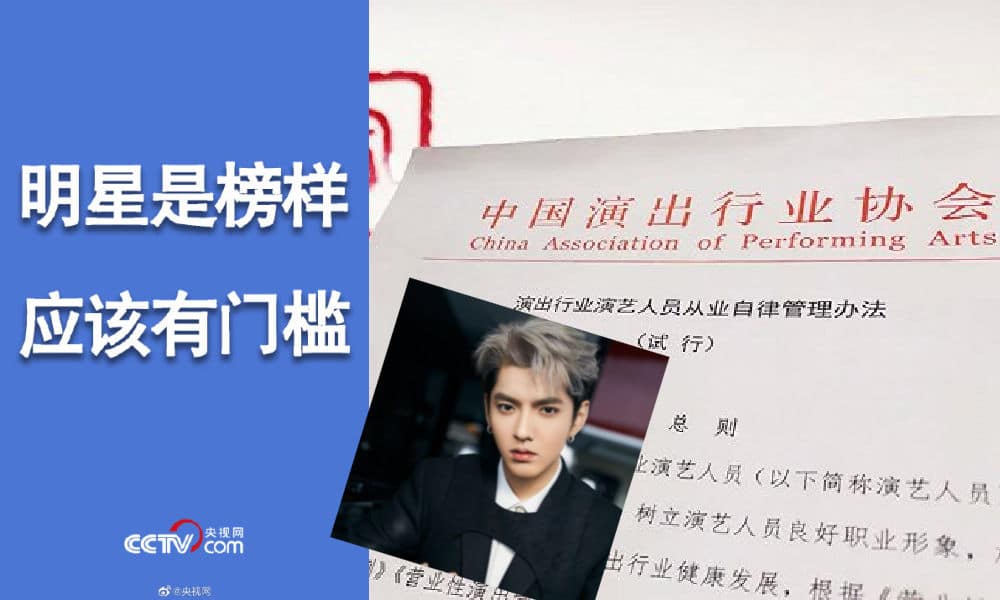
Pop star Kris Wu has dominated Chinese social media over the past few weeks, with news of his detainment over rape allegations leading to an explosion of comments on Weibo. The Kris Wu scandal has sparked an online debate over ‘raising the bar for becoming a star’ and the moral responsibilities of Chinese idols.
The Chinese-Canadian superstar Kris Wu, better known as Wu Yifan (吴亦凡) in China, has been a trending topic on Chinese social media ever since he was first accused of pressuring women into sex.
The 19-year-old student Meizhu Du (都美竹) was the first to accuse Wu of predatory behavior, with at least 24 more women coming forward claiming the celebrity showed inappropriate behavior and luring young women into sexual relationships.
Although Wu denied all allegations, more than a dozen firms either cut ties or terminated contracts with him. As the scandal unfolded, various hashtags related to the story received billions of views on Weibo.
When news of Kris Wu’s detainment came out on July 31st, Weibo’s servers barely seemed to be able to handle the spike in traffic, and comments came pouring in.
At an earlier stage of this social media storm, China’s state-owned media outlet CCTV sent out a Weibo post on July 20 that called for “raising the bar” to become a celebrity.
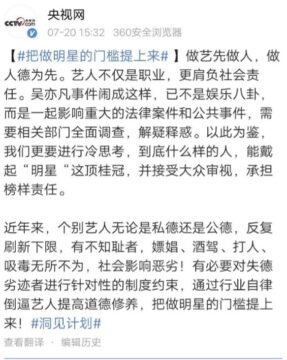
The CCTV statement argued that celebrities need to uphold their social responsibility and that they should be “a person first, and celebrity second.” It also said that the entertainment industry plays a role in this, as it “should urge celebrities to improve their moral standards through rigorous self-discipline.”
The post echoes the Standards of Conduct issued by the China Association of Performing Arts in February of this year, which contained a list of moral guidelines and rules of conduct for Chinese performers.
According to the document, which also attracted media attention at the time, a special “Ethics Building Committee” (道德建设委员会) was established to emphasize the enforcement.
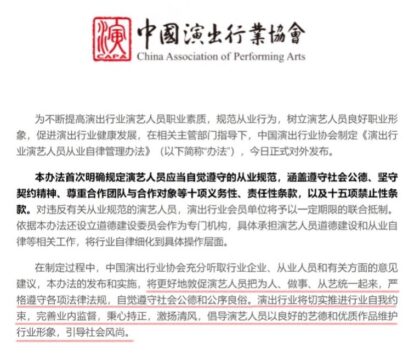
“Self-disciplinary measures” for performers.
According to the guidelines, “performers who violate the regulations will face boycotts by member units within a certain period of time.” It also states that performers who fail to comply with the guidelines could face a permanent ban from their profession – such a boycott will usually come from the top.
China has a thriving celebrity culture and celebrities have an enormous influence on Chinese social media and popular culture. Channeling public opinion and safeguarding social stability are priorities for Chinese authorities, and the influence of Chinese celebrities is often used to promote Party ideology and policies.
While authorities encourage Chinese celebrities to act as positive role models, negative news surrounding the country’s most famous stars is often perceived as having a “negative social impact” or a “bad influence on public morale.”
When Chinese actress Fan Bingbing was caught up in a tax evasion scandal, she was labeled as “not socially responsible.” After the dramatic and dirty divorce of Wang Baoqiang and Ma Rong topped all trending lists, China’s media watchdog announced it would guard against the hyping of these kinds of scandals due to their supposedly harmful impact.
These previous examples, the recent call by CCTV, and this year’s regulations for the performance industry demonstrate China’s determination to “promote a healthy entertainment environment” and to encourage the idea that Chinese artists should be “role models” who abide by the rules of “social morality.”
Since Kris Wu made his debut in 2012 as one of the members of EXO, his road to stardom over the past nine years overlapped the “internet age” (流量元年) in China. The blooming of digital media has changed the traditional Chinese entertainment landscape. With access to a huge population of fans and fast-growing social media, a strong public relations team can essentially guarantee public appearances and a stable flow of money. The rapid development of reality shows has also brought out seemingly endless opportunities for artists to become famous.
However, as the saying goes, “heavy is the head who wears the crown,” – most Chinese netizens seem to agree with the idea that society should set higher expectations for celebrities. The post by CCTV soon attracted over 5,3 million likes and nearly 180,000 comments.
“Public figures should take responsibility for their behavior. Once they break the rules, they will be criticized by society and the mainstream media. At the end of the day, the public will imitate the idols (and their behavior),” one Weibo user wrote.
After the recent surrogacy scandal of Chinese actress Zheng Shuang, Wu’s case has once again renewed discussions over the moral standards of celebrities. More and more people have started to question what makes someone qualified to be an idol and whether the bar for becoming a celebrity is set too low.
“The law is only the minimum standard for people’s code of conduct, the goal shouldn’t be just to obey the law, right?” one of the top-rated commenters wrote on Weibo. Others also argued that “the bar for becoming an idol is simply set too low!”

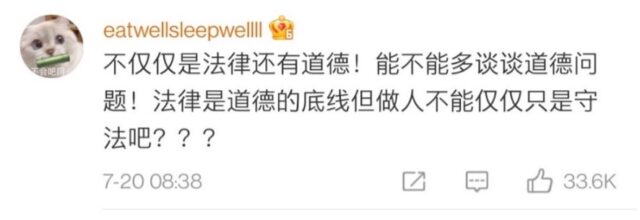
“The entertainment industry has become a place to shelter evil people, it’s rotten to the core. I don’t like any of it,” another commenter wrote, with someone adding: “Their standards are too low and they make money too fast.”
By August 2nd, the hashtag “Raise the Bar For Becoming a Star” (#把做明星的门槛提上来#) had received over 680 million views on Weibo.
In light of China’s enormous celebrity culture, online discussions over whether celebrities should hold themselves to a higher moral standard will undoubtedly continue. Despite the many online disagreements regarding the Kris Wu case, most netizens seem to agree that there should be more to Chinese celebrities than fame, money, and the latest scandal.
By Yunyi Wang
Follow @whatsonweibo
Spotted a mistake or want to add something? Please let us know in the comments below or email us. First-time commenters, please be patient – we will have to manually approve your comment before it appears.
©2021 Whatsonweibo. All rights reserved. Do not reproduce our content without permission – you can contact us at info@whatsonweibo.com.
Stories that are authored by the What's on Weibo Team are the stories that multiple authors contributed to. Please check the names at the end of the articles to see who the authors are.

Also Read
China Arts & Entertainment
Jia Ling Returns to the Limelight with New “YOLO” Movie and 110-Pound Weight Loss Announcement
After a year away from the spotlight, Chinese actress and director Jia Ling is back, announcing both a new film and slimmer figure.
Published
7 months agoon
January 11, 2024
Chinese actress and director Jia Ling (贾玲) has been trending on Weibo thanks to her upcoming film YOLO (热辣滚烫) and her remarkable weight loss transformation.
Jia Ling is a famous Chinese comedian actress, known for her annual Spring Festival Gala performances. She has been especially successful in the previous years as she made her directorial debut in 2021 with the award-winning box office hit Hi, Mom (Chinese title Hi, Li Huanying 你好,李焕英), in which she also stars as the female protagonist. That same year, audiences saw her as Wu Ge in Embrace Again (穿过寒冬拥抱你).
It has been a while since we’ve heard from Jia Ling, but on January 11, she resurfaced with a Weibo post in which she explained her absence from the limelight.
In her post, Jia wrote that she has spent the entire year working on the YOLO (热辣滚烫) movie, for which she lost a staggering 100 jin (斤) (110 lbs/50 kg). Just as with Hi, Mum, Jia is both the director of YOLO and the lead actress.
According to Jia, it was a tiring and “hungry” year, during which she ended up “looking like a boxer.” She added that the movie, set to premiere during the Spring Festival, is not necessarily about weight loss at all, but about learning to love yourself.
Within a single day, Jia Ling’s post received nearly 60,000 replies and over 855,000 likes.

Jia Ling’s post on Weibo.
The topic became top trending due to various reasons. It is because fans are excited to see Jia Ling back in the limelight and are anticipating the upcoming movie, but also because they are eager to see Jia Ling’s transformation.
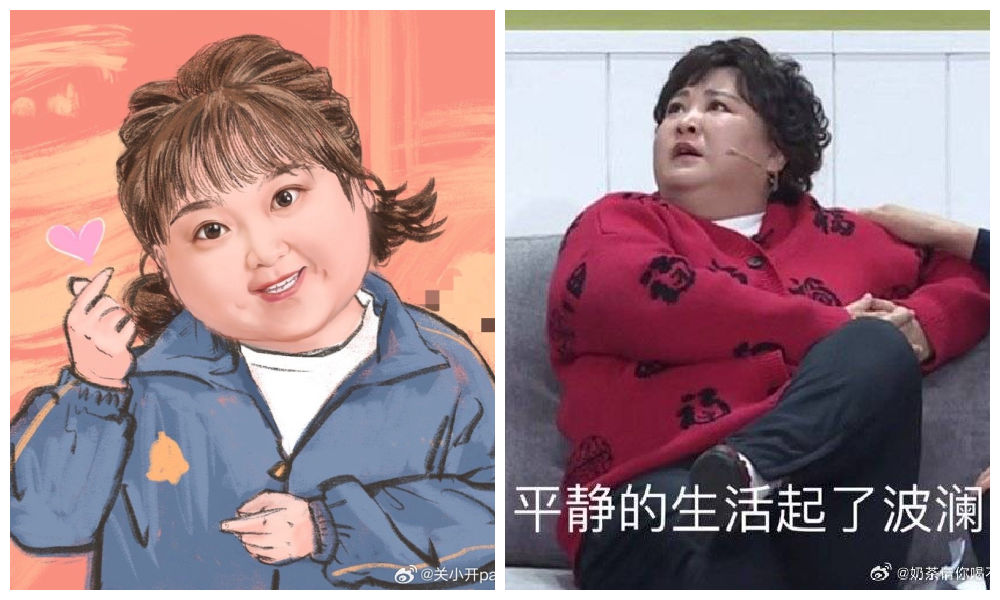
From fans on Weibo: Jia Ling fanart and a meme from one of her well-known Spring Festival performances.
A short scene from the movie showed Jia Ling’s slimmer appearance, and a screenshot of it went viral, with Weibo users saying they hardly recognized Jia anymore.
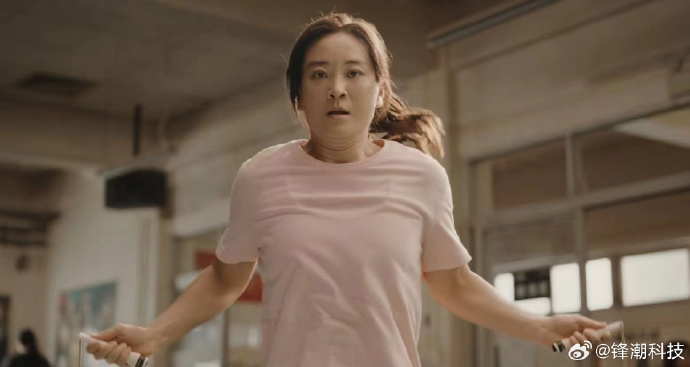
One hashtag related to Jia Ling’s weight loss, about expert views on losing so much weight in such a relatively short time, received over 450 million on Weibo on Thursday (#医生谈贾玲整容式暴瘦#).
Perhaps unsurprisingly, medical experts quoted by Chinese media outlets caution against rapid weight loss methods, recommending a more gradual approach instead.
Nevertheless, there is great interest in the extreme diets of Chinese celebrities. As discussed in an earlier article about China’s celebrity weight craze, the weight loss journey of Chines actors or influencers often capture widespread attention as people are keen to adopt diet plans promoted by celebrities.
YOLO (热辣滚烫), which will hit Chinese theaters on February 10, tells the story of Le Ying (乐莹), who has withdrawn from social life and isolated herself at home ever since graduation. Trying to get her life back on track, Le Ying meets a boxing coach. The meeting proves to be just the beginning of a new journey in life filled with unforeseen challenges.
The Spring Festival holiday typically sees peak box office numbers in China, making this movie highly anticipated, particularly after the success of Hi, Mum three years ago. On Weibo, many view Jia Ling’s weight loss as a testament to her dedication and are eager to see the results of her year-long efforts in the cinema next month.
By Manya Koetse
Get the story behind the hashtag. Subscribe to What’s on Weibo here to receive our newsletter and get access to our latest articles:
Spotted a mistake or want to add something? Please let us know in comments below or email us. First-time commenters, please be patient – we will have to manually approve your comment before it appears.
©2024 Whatsonweibo. All rights reserved. Do not reproduce our content without permission – you can contact us at info@whatsonweibo.com.
China Celebs
Three Reasons Why Lipstick King’s ‘Eyebrow Pencil Gate’ Has Blown Up
From beauty guru to betrayal: why one livestream moment is shaking China’s internet.
Published
11 months agoon
September 13, 2023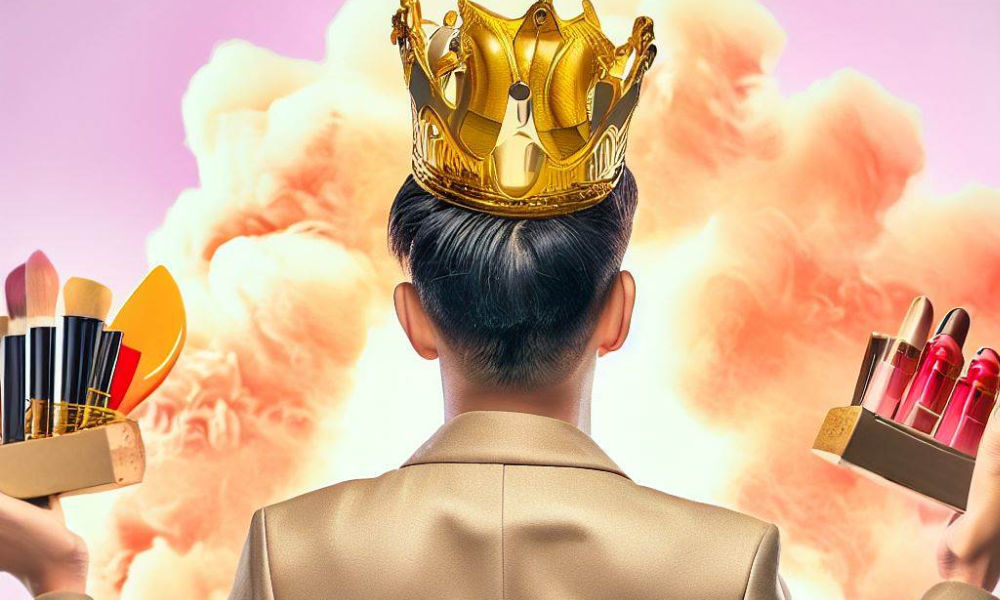
PREMIUM CONTENT
Li Jiaqi, also known as Austin Li the ‘Lipstick King,’ has become the focus of intense media attention in China over the past days.
The controversy began when the popular beauty influencer responded with apparent annoyance to a viewer’s comment about the high price of an eyebrow pencil. As a result, his fans began unfollowing him, netizens started scolding him, Chinese state criticized him, and the memes started flooding in.
Li Jiaqi’s tearful apology did not fix anything.
We reported about the incident here shortly after it went trending, and you can see the translated video of the moment here:
China's famous make-up influencer #LiJiaqi is in hot water due to an e-commerce livestream he did on Sunday. When viewers complained about an eyebrow pencil being too expensive (79 RMB/$10.9), he got annoyed, insisting that the product was not expensive at all. Translated video: pic.twitter.com/JDKGMKovDX
— Manya Koetse (@manyapan) September 11, 2023
The incident may seem minor at first glance. Li was merely promoting Florasis brand (花西子) eyebrow pencils, and some viewers expressed their opinion that the pencils, priced at 79 yuan ($11), had become more expensive.
In response, Li displayed irritation, questioning, “Expensive how?” He went on to suggest that viewers should also reflect on their own efforts and whether they were working hard enough to get a salary increase.
But there is more to this incident than just an $11 pencil and an unsympathetic response.
#1 The King Who Forgot the People Who Crowned Him
The initial reaction of netizens to Li Jiaqi’s remarks during the September 10th livestream was characterized by a strong sense of anger and disappointment.
Although celebrities often face scrutiny when displaying signs of arrogance after their rise to fame, the position of Li Jiaqi in the wanghong (internet celebrity) scene has been especially unique. He initially worked as a beauty consultant for L’Oreal within a shopping mall before embarking on his livestreaming career through Alibaba’s Taobao platform.
In a time when consumers have access to thousands of makeup products across various price ranges, Li Jiaqi established himself as a trusted cosmetics expert. People relied on his expertise to recommend the right products at the right prices, and his practice of personally applying and showcasing various lipstick colors made him all the more popular. He soon garnered millions of online fans who started calling him the Lipstick King.
By 2018, he had already amassed a significant fortune of 10 million yuan ($1.53 million). Fast forward three years, and his wealth had ballooned to an astonishing 18.5 billion yuan ($2.5 billion).
Despite his growing wealth, Li continued to enjoy the support of his fans, who appreciated his honest assessments of products during live testing sessions. He was known for candidly informing viewers when a product wasn’t worth buying, and the story of his humble beginnings as a shop assistant played a major role in why people trusted him and wanted him to succeed.
However, his recent change in tone, where he no longer seemed considerate of viewers who might find an $11 brow pencil to be expensive, suggests that he may have lost touch with his own customer base. Some individuals perceive this shift as a form of actual “betrayal” (背叛), as if a close friend has turned their back on them.

The viral cartoon shows Li Jiaqi going from a friendly beggar to angry rat.
One cartoon shared on social media shows Li Jiaqi, with mouse ears, as he initially begs his online viewers for money. However, as he becomes more prosperous, the cartoon portrays him gradually growing arrogant and eventually scolding those who helped him rise to fame.
Many people accuse Li of being insincere, suggesting that he revealed his true colors during that short livestream moment. This is also one of the reasons why most commenters say they do not believe his tears during his apology video.
“He betrayed China’s working class,” one popular vlog suggested.
#2 Internet Celebrity Crossing the Lines
Another reason why the incident involving Li Jiaqi is causing such a storm is related to the media context in which Chinese (internet) celebrities operate and what is expected of them.
Whether you are an actor, singer, comedian, or a famous livestreamer/e-commerce influencer, Chinese celebrities and performers are seen as fulfilling an exemplary role in society, serving the people and the nation (Jeffrey & Xu 2023). This is why, as explained in the 2019 research report by Jonathan Sullivan and Séagh Kehoe, moral components play such a significant role in Chinese celebrity culture.
In today’s age of social media, the role of celebrities in society has evolved to become even more significant as they have a vast reach and profound influence that extends to countless people and industries.
Their powerful influence makes celebrities important tools for authorities to convey messages that align with their goals – and definitely not contradict them. Through the media and cultural industries, the state can exert a certain level of control within the symbolic economy in which celebrities operate, as discussed by Sullivan and Kehoe in their 2019 work (p. 242).
This control over celebrities’ actions became particularly evident in the case of Li Jiaqi in 2022, following the ‘cake tank incident’ (坦克蛋糕事件). This incident unfolded during one of his livestreams when Li Jiaqi and his co-host introduced a chocolate cake in the shape of a tank, with an assistant in the back mentioning something about the sound of shooting coming from a tank (“坦克突突”). This livestream took place on June 3rd, on the night before the 33rd anniversary of the crackdown on the Tiananmen protests.
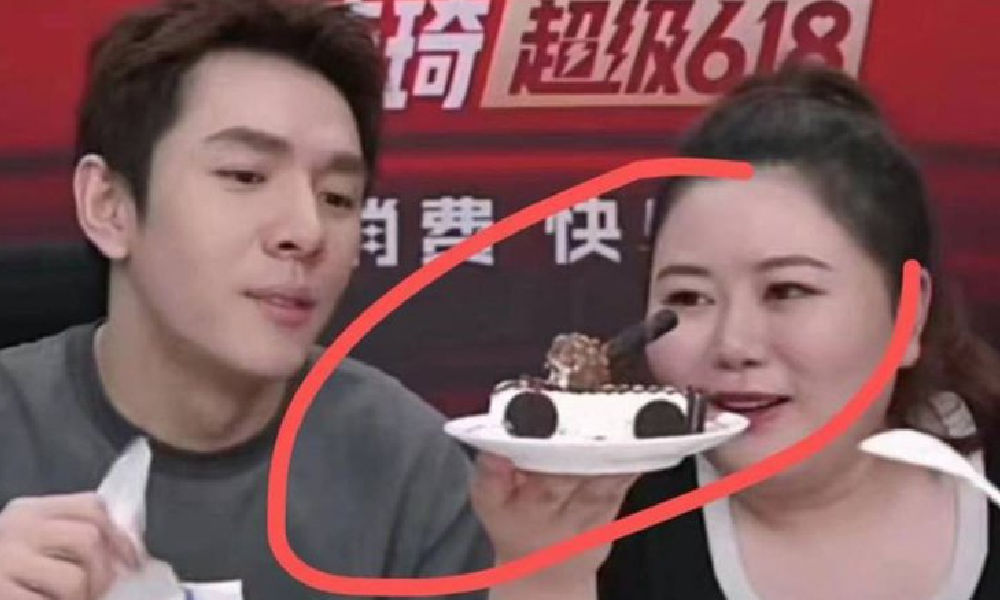
While Li Jiaqi did not directly touch upon a politically sensitive issue with his controversial livestream, his actions were perceived as a disregard for customer loyalty and displayed an arrogance inconsistent with socialist core values. This behavior garnered criticism in a recent post by the state media outlet CCTV.
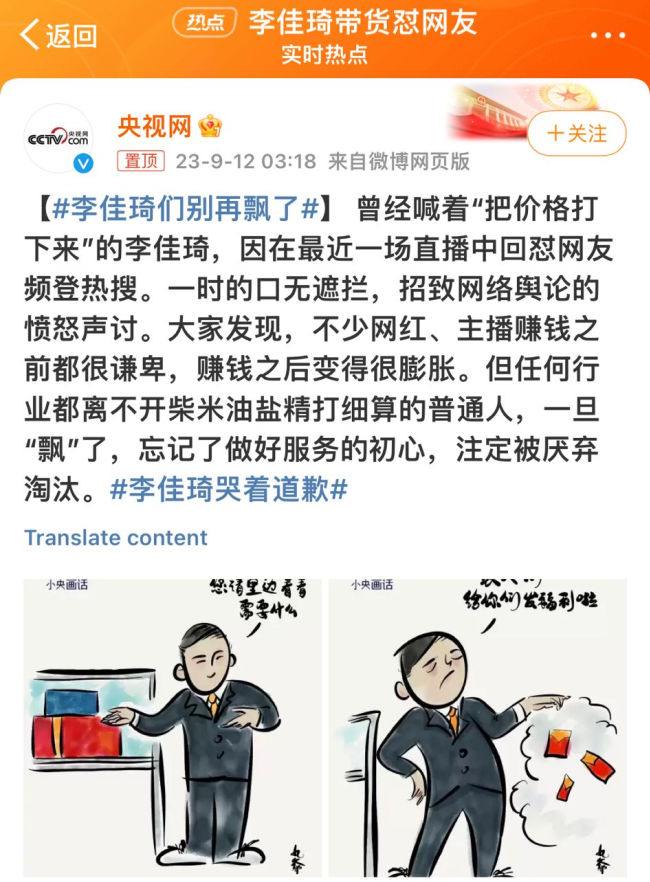
Post by CCTV condemning Li’s behavior.
Other state media outlets and official channels have joined in responding to the issue, amplifying the narrative of a conflict between the ‘common people’ and the ‘arrogant influencer.’
#3 Striking a Wrong Chord in Challenging Times
Lastly, Li Jiaqi’s controversial livestream moment also became especially big due to the specific words he said about people needing to reflect on their own work efforts if they cannot afford a $11 eyebrow pencil.
Various online discussions and some media, including CNN, are tying the backlash to young unemployment, tepid consumer spending, and the ongoing economic challenges faced by workers in China.
Since recent years, the term nèijuǎn (‘involution’, 内卷) has gained prominence when discussing the frustrations experienced by many young people in China. It serves as a concept to explain the social dynamics of China’s growing middle class who often find themselves stuck in a “rat race”; a highly competitive education and work environment, where everyone is continually intensifying their efforts to outperform one another, leading to this catch 22 situation where everyone appears to be caught in an unending cycle of exertion without substantial progress (read more here).
Weibo commenters note that, given China’s current employment situation and wage levels, hard work is not necessarily awarded with higher income. This context makes Li Jiaqi’s comments seem even more unnecessary and disconnected from the realities faced by his customers. One Shanghai surgeon responded to Li’s comments, saying that the fact that his salary has not increased over the last few year certainly is not because he is not working hard enough (#上海胸外科医生回应李佳琦言论#).
Some observers also recognize that Li, as an e-commerce professional, is, in a way, trapped in the same cycle of “inversion” where brands are continuously driving prices down to such low levels that consumers perceive it as the new normal. However, this pricing strategy may not be sustainable in the long run. (Ironically, some brands currently profiting from the controversy by promoting their own 79 yuan deals, suggesting their deal is much better than Li’s. Among them is the domestic brand Bee & Flower 蜂花, which is offering special skin care products sets for 79 yuan in light of the controversy.)
Many discussions therefore also revolve around the question of whether 79 yuan or $11 can be considered expensive for an eyebrow pencil, and opinions are divided. Some argue that people pay much more for skincare products, while others point out that if you were to weigh the actual quantity of pencil color, its price would surpass that of gold.
The incident has sparked discussions about the significance of 79 yuan in today’s times, under the hashtag “What is 79 yuan to normal people” (#79元对于普通人来说意味着什么#).
People have shared their perspectives, highlighting what this amount means in their daily lives. For some, it represents an entire day’s worth of home-cooked meals for a family. It exceeds the daily wages of certain workers, like street cleaners. Others equate it to the cost of 15 office lunches.

One netizen posts 79 yuan ($10.9) worth of groceries.
Amid all these discussions, it also becomes clear that many people are trying to live a frugal live in a time when their wages are not increasing, and that Li’s comments are just one reason to vent their frustrations about the situation they are in, In those regards, Li’s remarks really come at a wrong time, especially coming from a billionaire.
Will Li be able to continue his career after this?
Some are suggesting that it is time for Li to take some rest, speculating that Li’s behavior might stem from burn-out and mental issues. Others think that Li’s hardcore fans will remain loyal to their e-commerce idol.
For now, Li Jiaqi must tread carefully. He has already lost 1.3 million followers on his Weibo account. What’s even more challenging than regaining those one million followers is rebuilding the trust of his viewers.
Update: On September 19, the Florasis/Huaxizi brand finally apologized for its late response to the controversy, and the brand stated that the controversy provided an opportunity for them to listen to “the voice of their consumers.” Their decision to release a statement seemed fruitful: they gained 20,000 new followers in a night.
By Manya Koetse
with contributions by Miranda Barnes
Jeffreys, Elaine, and Jian Xu. 2023. “Governing China’s Celebrities.” Australian Institute of International Affairs, 18 May https://www.internationalaffairs.org.au/australianoutlook/governing-chinas-celebrities/ [12 Sep 2023].
Sullivan, Jonathan, and Séagh Kehoe. 2019. “Truth, Good and Beauty: The Politics of Celebrity in China.” The China Quarterly 237 (March): 241–256.
Spotted a mistake or want to add something? Please let us know in comments below or email us. First-time commenters, please be patient – we will have to manually approve your comment before it appears.
©2023 Whatsonweibo. All rights reserved. Do not reproduce our content without permission – you can contact us at info@whatsonweibo.com.
Subscribe

Weibo Watch: The Future is Here

“Bye Bye Biden”: Biden’s Many Nicknames in Chinese

Enjoying the ‘Sea’ in Beijing’s Ditan Park

A Triumph for “Comrade Trump”: Chinese Social Media Reactions to Trump Rally Shooting

Weibo Watch: Get Up, Stand Up

The Tragic Story of “Fat Cat”: How a Chinese Gamer’s Suicide Went Viral

“Old Bull Eating Young Grass”: 86-Year-Old Chinese Painter Fan Zeng Marries 36-Year-Old Xu Meng

A Brew of Controversy: Lu Xun and LELECHA’s ‘Smoky’ Oolong Tea

Singing Competition or Patriotic Fight? Hunan TV’s ‘Singer 2024’ Stirs Nationalistic Sentiments

Zara Dress Goes Viral in China for Resemblance to Haidilao Apron

Weibo Watch: The Battle for the Bottom Bed

About the “AI Chatbot Based on Xi Jinping” Story

China’s Intensified Social Media Propaganda: “Taiwan Must Return to Motherland”

Weibo Watch: Telling China’s Stories Wrong

Saying Goodbye to “Uncle Wang”: Wang Wenbin Becomes Chinese Ambassador to Cambodia
Get in touch
Would you like to become a contributor, or do you have any tips or suggestions? Get in touch here!
Popular Reads
-

 China Insight3 months ago
China Insight3 months agoThe Tragic Story of “Fat Cat”: How a Chinese Gamer’s Suicide Went Viral
-

 China Music4 months ago
China Music4 months agoThe Chinese Viral TikTok Song Explained (No, It’s Not About Samsung)
-

 China Digital10 months ago
China Digital10 months agoToo Sexy for Weibo? Online Discussions on the Concept of ‘Cābiān’
-

 China Arts & Entertainment12 months ago
China Arts & Entertainment12 months agoBehind 8 Billion Streams: Who is Dao Lang Cursing in the Chinese Hit Song ‘Luocha Kingdom’?




